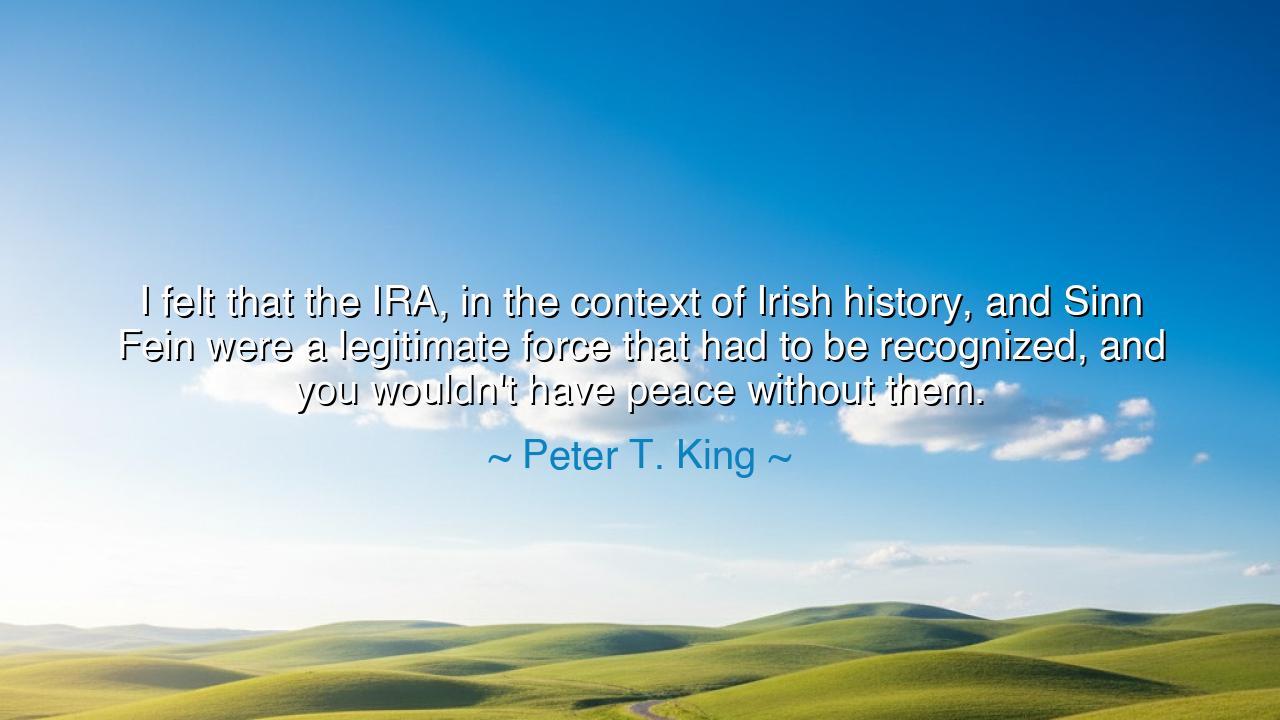
I felt that the IRA, in the context of Irish history, and Sinn
I felt that the IRA, in the context of Irish history, and Sinn Fein were a legitimate force that had to be recognized, and you wouldn't have peace without them.






Peter T. King, a man of conviction and political courage, once declared: “I felt that the IRA, in the context of Irish history, and Sinn Féin were a legitimate force that had to be recognized, and you wouldn't have peace without them.” These words echo across the centuries, not as an endorsement of violence, but as a recognition of truth, of context, and of the inescapable reality that peace cannot be built by denying the existence of conflict. In this statement lies the timeless wisdom of reconciliation — that to heal a nation torn by struggle, one must face even its most uncomfortable truths with clarity and compassion.
The meaning of this quote lies in understanding that no peace can endure unless all who bleed for it are allowed a voice at the table. King speaks not of approval, but of acknowledgment — the acknowledgment that the Irish Republican Army (IRA) and Sinn Féin were not mere intrusions upon history, but products of it. In the centuries-long struggle of Ireland against colonization, oppression, and partition, these groups emerged as expressions of a people’s desperation for identity and self-determination. To pretend otherwise, to silence or exclude them, would be to build peace upon denial — a fragile peace that could never last. Thus, King’s words are not the language of politics alone, but of historical realism, born from the understanding that even the most radical actors must be part of the story they helped to shape.
The origin of King’s statement can be traced to the complex and painful saga of The Troubles — that long and bitter conflict that scarred Northern Ireland from the late 1960s through the 1990s. It was a time when neighbors became enemies, when bullets replaced dialogue, and when generations lived under the shadow of fear. The IRA, for all its controversy, was not born in a vacuum. It arose from the long echo of conquest and rebellion — from the memory of Cromwell’s conquest, the famine, the Easter Rising, and the partition of 1921, which left Ireland divided and millions feeling abandoned. To Peter King, the IRA and Sinn Féin were part of this continuum — not aberrations, but reflections of a historical wound unhealed.
History offers parallels that illuminate King’s meaning. When Nelson Mandela and the African National Congress (ANC) fought against apartheid in South Africa, they too were branded as terrorists. Yet when the time for peace arrived, Mandela himself said that without recognizing and negotiating with the ANC, there could be no reconciliation. The Good Friday Agreement of 1998 in Northern Ireland followed the same pattern: it was not achieved by victory over one side, but by recognition, by the realization that enduring peace required listening even to those whose methods had been condemned. What King understood — and what many fear to admit — is that lasting peace is born not from suppression, but from inclusion.
In speaking thus, King was not blind to the blood that had been shed, nor naïve about the pain inflicted. Rather, he saw with the eyes of realpolitik and empathy — the eyes of one who knows that nations, like people, must eventually confront their shadows. The IRA, like many revolutionary movements before it, had acted in violence; yet its existence spoke of something deeper: a people unheard. King’s insight was that ignoring them would not erase them; it would only prolong the cycle of war. True statesmanship, therefore, lies not in condemnation alone, but in transformation — in turning weapons into words and grievance into governance.
This principle is as old as civilization itself. When Rome conquered her enemies, she did not destroy them utterly — she made them citizens. When Abraham Lincoln sought to heal America after its Civil War, he said, “With malice toward none, with charity for all.” He understood, as King did, that reconciliation is not weakness, but wisdom. To make peace, one must embrace one’s adversary as part of the same humanity, part of the same history. In the Irish conflict, this meant recognizing that both the Unionist and the Republican, the Protestant and the Catholic, carried within them the same desire — to belong, to live without fear, to have their story heard.
The lesson that flows from Peter King’s words reaches beyond Ireland and beyond politics. It teaches us that understanding is the first act of peace. We may not condone the actions of those who fight, but we must seek to comprehend the forces that made them fight. In every conflict — whether between nations, communities, or individuals — there comes a moment when the courage to listen must replace the instinct to condemn. Peace is not born from victory, but from recognition — from the willingness to see one’s enemy not as a monster, but as a mirror of one’s own pain.
So, remember this wisdom, children of the future: no peace can be built upon exclusion. The path to reconciliation demands the humility to hear every voice, even the ones that once roared in anger. If you would heal what is broken, you must first understand why it broke. As Peter T. King declared, to make peace, you must recognize every force that shaped the struggle — for in the end, peace is not forged by erasing conflict, but by transforming it into understanding. And from that understanding, the sword is finally laid down — not in defeat, but in human triumph.






AAdministratorAdministrator
Welcome, honored guests. Please leave a comment, we will respond soon